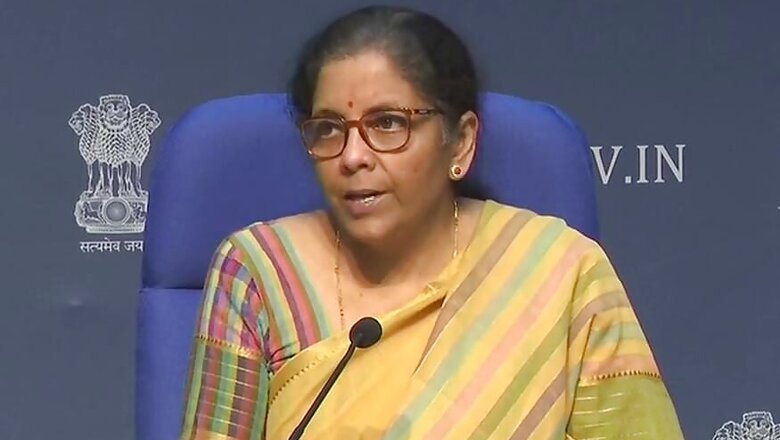
views
How many Indians are going hungry because of the Covid-19 induced lockdown and how many of these are outside the ambit of the UPA-era National Food Security Act (NFSA)? In the times of a global pandemic, when the world’s harshest lockdown has rendered crores of migrant Indians homeless, jobless and hungry, the government doesn’t seem to have an accurate estimate of how many internal migrants are going hungry and whether all the poor intended to be covered under the NFSA are indeed being covered.
The NFSA mandates free rations to targeted poor families but neither coverage under the act is complete nor is there an estimate of those additionally going hungry because of the current crisis.
Last month, when the lockdown and resulting migrant crisis was spawning widespread hunger, the ‘Right to Food Campaign’ had sought universal access to free food grains for six months for anyone in need. A similar suggestion was also subsequently made by Nobel laureates Amartya Sen and Abhijit Banerjee together with former RBI governor Raghuram Rajan.
With this background, the Centre has now announced free food grain for two months (May and June) for stranded migrants totalling eight crore. It is possible that more steps to help migrants are announced in the coming days.
Thursday’s announcement is a positive step but still leaves much to be desired – free foodgrain for just two months isn’t seen as adequate, there is no cash component in the package and its implementation has been left entirely to states. If, as some reports suggest, Aadhaar cards will be made mandatory for availing free foodgrain, then again a substantial number of the hungry may fall through the cracks.
As per finance minister Nirmala Sitharaman, additional food grain will be provided by the Centre to all the states and union territories at the rate of 5 kg per migrant labourer besides a kg of gram per family per month for two months (May and June 2020), for free.
An official statement noted that those migrants who are not covered under the NFSA or who are without a ration card, in the state/UT in which they are stranded, will be eligible for free food grains for two months. States/UTs will have to put a mechanism in place for targeted distribution and eight lakh metric tonnes of food-grain plus 50,000 MT of Chana shall be allocated under this scheme.
The entire outlay of Rs 3500 crore for this will be borne by the Centre – which means the Centre will spend Rs 437 per stranded migrant worker for this exercise.
Deepa Sinha of the Right to Food Campaign said the relief package for migrants is “too little, too late. The crisis has been on for two months, people have been facing hunger and have been taking drastic steps such as walking back thousands of miles to their homes. The relief is too little because it does not address the scale of the crisis. Where is the Rs 20 lakh crore if for the most important need – basic food security- allocation is just Rs 3500 crore?”
In any case, the eight crore migrants which are to be provided for under this scheme may not be the only Indians going hungry. “Going by the NFSA and updating the population for 2020, there could be almost ten crore people who are left out of the NFSA ambit today. But actually, those left hungry would be a much larger number because a different crisis is going on right now and people not eligible earlier under NFSA are also facing hunger,” Sinha said.
The NFSA covers 67 per cent of the population (on average 75 per cent in rural areas and 50 per cent in urban areas). The current estimates of the eligible population for free rations are based on the population figures from the 2011 Census (1.24 billion), almost a decade old. As per Census 2011, NFSA covers 83 crore people. But if were to take the current population of 1.38 billion, then even by the NFSA mandated coverage anywhere between 9-10 crore remain uncovered.
Activists also pointed out that the eight crore number announced by the FM perhaps came from state governments, some of which have allowed free food grains to people without ration cards, and therefore, have some estimates of the numbers.
In Delhi, for example, nearly 36 lakh non-PDS migrants had applied for free rations during the pandemic, before the website dedicated for this purpose was closed. In any case, even if all the eight crore estimated non-PDS migrants get the free ration the government has promised for two months, many others will continue to remain hungry.
The Federation of Indian Chambers of Commerce & Industry (Ficci) welcomed the announcement but said the real challenge lay in implementation. “On several occasions we have seen that identification of the beneficiaries is a major challenge and we hope that under the programs, the delivery of intended benefits is not limited by the implementation capacity of the state machinery. This would be the key. FICCI would therefore advocate that even as the government takes more such measures it should try and leverage the benefits of the excellent JAM trinity that has been created and consider transferring larger cash amounts directly into the Jan Dhan bank accounts of people”.
This echoes the demand made by the Congress multiple times about transferring larger amounts of cash in Jan Dhan accounts. Rajendran Narayanan of Stranded Workers Action Network (SWAN) said, “There is no cash component in the relief package even when most of these people haven’t been paid. A SWAN study showed only 6% of migrants have been paid wages. Then, the government is offering just rice or wheat but no money for vegetables, medicines or a phone recharge. The FM had promised on March 26 that a kg of daal will be given under PDS – more than a month has passed but hardly any states have been giving daal.”
SWAN has estimated "short term circular" migrants to be 6.5 crore but if long term migrants are also included, the number could cross 10 crore. Rajendran also pointed out that with a large number of migrant already in transit to their home states, how will they be contacted and supplied with the free foodgrain? Besides, while they are in transit, there is little use for uncooked meals.
Apart from the Rs 3500 crore allocation for free foodgrain for two months, the FM has also announced that ration cards will be made portable throughout the country by March 2021. This is for beneficiaries under the NFSA.
Again, a positive move but akin to old wine in a new bottle since the government has been implementing this scheme for two years now and has been actually lagging its own target of making ration cards acceptable anywhere in the country by almost one year.



















Comments
0 comment